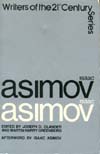Isaac Asimov is one of the most varied men of our time—biochemist, popularizer of science, and legendary science fiction writer. His astonishing productivity—more than 180 books published to date—has resulted in some of science fiction’s monumental works: his classic Foundation Trilogy, his brilliant fusion of SF and the mstery story in The Caves of Steel and The Naked Sun, and his remarkable robot stories.
This book is intended to broaden the reader’s perspectives about Asimov’s science fiction. Some of these perspectives are favorable, while others are critical; some are theoretical, while others are descriptive and “practical.” But each contributor aims to share a particular point of view about Asimov’s science fiction. In a delightful and informative afterword, Isaac Asimov responds with his own “Asimov’s Guide to Asimov.”
This is a collection of critical analyses of Asimov’s work by genuine literary critics. It is part of Taplinger’s Writers of the 21st Century Series, of which I have read no other volumes. It is therefore impossible for me to gague the book on the basis of its place within the series.
It should be noted that the book was published before Asimov’s lengthy collaboration with Greenberg (and often Ollander) on various science fiction anthologies.
The book consists of nine essays by various authors and an afterword by Asimov himself, “Asimov’s Guide to Asimov,” which I do not believe is otherwise available. One of the essays is a chapter from Joseph F. Patrouch’s excellent Science Fiction of Isaac Asimov. The others are all generally good and worth reading. Two, however, are standouts for not entirely positive reasons.
One is Maxine Moore’s “The Use of Technical Metaphors in Asimov’s Fiction,” which is an attempt to extract from Asimov’s work an implied electronic meaphor which simply doesn’t exist.
The other is Charles Elkins’ “Asimov’s Foundation Novels: Historical Materialism Distorted into Cyclical Psychohistory.” This essay is frequently cited by other authors (e.g., Brian W. Aldiss’ in The Trillion-Year Spree) and is the only one whose thesis is specifically addressed by Asimov in his afterword to the whole book.
Elkins starts out with a savage attack on the Foundation series. “From just about any formal perspective, the Foundation trilogy is seriously flawed,” he says. “Stylistically, the novels are diasters, and Asimov’s ear for dialogue is simply atrocious. The characters speak with a monotonous rhythm and impoverished vocabulary characteristic of American teenagers’ popular reading in the Forties and Fifties…” And so on.
So why, he wonders, are they so popular? Taking a clue from a description of the Futurians by Donald A. Wolheim, Elkins posits that Asimov was influenced by the watered-down version of Marxist thinking popular in some American intellectual circles in the 1930’s. That this isn’t true Marxism Elkins shows at some length—and thank goodness for that, at least, as I have never been able to follow Marxist philosophy when I’ve attempted to read it. In attempting to follow Marxism, however, Asimov fails (as he doesn’t understand it) and only manages to embody the kind of anti-Marxist thinking that Marxism is intended to supercede.
Er, OK.
Elkins essay is an important one, but personally I think he’s way off base. If Asimov fails criteria for literary excellence yet maintains popularity the answer is much simpler than Elkins seems to be willing to admit: most people care about good story-telling and not about literary excellence. Good story-telling can cover a plethora of literary sins. This is particularly true in sf where some of the consistently most popular writers such as Asimov, Heinlein, and Clarke, are nowhere near the literary quality of authors such as Sturgeon, Ellison, and Bradbury and yet continue to sell when the others are forgotten—not, I hope, that anybody has actually forgotten Sturgeon, Ellison, or Bradbury. And, of course, the most recent example of a writer who has been hugely successful despite the disdain of many literary critics is J.K. Rowling.
(Asimov himself once took me to task for criticizing him when he praised Edgar Rice Burroughs, and rightly so. Burroughs, he told me, was a good story-teller, and that matters a great deal.)
The book as a whole is a very good one and worth having. It’s rather dated as a third of a century has passed and some of Asimov’s more important works have been published in the time since. It’s definitely something the Asimov fan should own.


